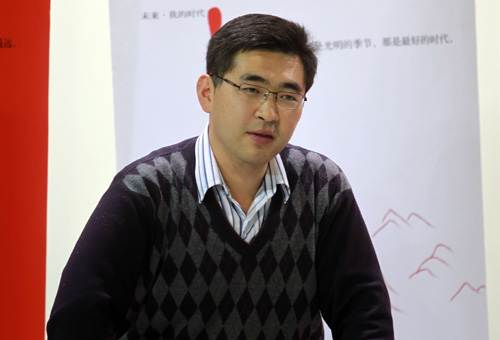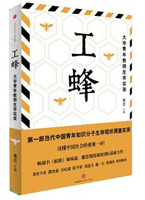|
 |
|
ACADEMIC LIVES: Lian Si, the author of a book that takes a look at the hardships of young college faculty members (WEI YAO) |

In a recently published book entitled Worker Bees, The Life of Young University Teachers, Lian Si, an associate professor at the Beijing-based University of International Business and Economics, compared young college teachers to worker bees.
Worker bees are at the lowest level of a bee colony, in which they feed the queen, drones and larva with food they have collected, and perform other chores such as cleaning, repairing and defending the hive.
The book is based on a survey of college faculty under the age of 40 in five cities—Beijing, Shanghai, Guangzhou in southern Guangdong Province, Wuhan in central Hubei Province and Xi'an in northwestern Shaanxi Province. Statistics from the Ministry of Education show that as of the end of 2010, the number of college faculty under 40 surpassed 860,000 in China, accounting for 63.3 percent of the total.
The survey revealed that 84.5 percent of the 5,138 respondents believed that they were at the middle or lower end of the social stratum, and 72.3 percent reported feeling stressed from the heavy research and teaching workload and low income.
Lian said that a major source of the stress felt by young college faculty members is the changing social value system. "Power and money have replaced knowledge and morality to become the core evaluation criteria. The overall status of intellectuals has dropped," he said.
Lian is also author of Ant Tribe, an influential book published in 2009 that shed lights on low-income college graduates residing in crowded quarters on the edge of Beijing. Lian likened the group to ants, which are also intelligent, weak and densely populated.
In 2010, Lian published the book's sequel, Ant Tribe II, which studied "ants" in several other big Chinese cities such as Shanghai.
Although China does not have an academic tenure system, an unspoken rule in universities today is that if a young faculty member cannot get the title of associate professor in five years, he or she must leave the university.
Yuan Bentao, Vice President of the Institute of Education in Tsinghua University, said that almost all universities now appraise faculty members' qualification for academic titles by the number of papers they published in academic journals recorded in the Science Citation Index (SCI), the Engineering Index (EI) or Chinese Social Science Citation Index (CSSCI), the number of books published, the number of awards earned and the number of important research projects they have conducted or participated in.
This evaluation system has put a lot of pressure on young faculty members. Peng Feng, a 33-year-old teacher described in Lian's new book, taught social science subjects for eight hours a week at a top university in Beijing. In the meantime, he also engaged in two research projects.
Peng's goal was to be promoted to an associate professor as early as possible and to a professor before turning 40. To achieve this goal, he planned to publish six papers in CSSCI-listed journals within three years.
Research and teaching kept Peng fully occupied. In the morning, he usually looked up materials, did some reading, wrote research reports and tutored students. In the afternoon, he taught for two hours, and then spent one hour or so handling miscellaneous affairs such as reimbursements. On the weekends, he sometimes traveled to academic meetings.
In addition, Peng made time to build a network, hoping to achieve his goals earlier.
Lian's survey showed that meeting the standard for senior academic titles is not an easy task. The study found that in the preceding three years, 20.5 percent of young college teachers in social science and humanities did not publish a CSSCI-indexed paper, 92.5 percent of those in science did not publish any SCI-indexed paper, while 85.5 percent of those in engineering did not publish any EI-indexed paper. During the same period, 83.2 percent young college teachers failed to publish any independently authored books.
Peng had worked for almost five years, and was still a lecturer. Only one fourth of his peers had attained the title of associate professor, and almost none became a professor before turning 40.
In addition to stress from work, young college teachers are also subject to financial pressure.
Although being a university teacher is widely thought of as a prestigious occupation, Lian said that young college faculty members are not highly paid.
| 